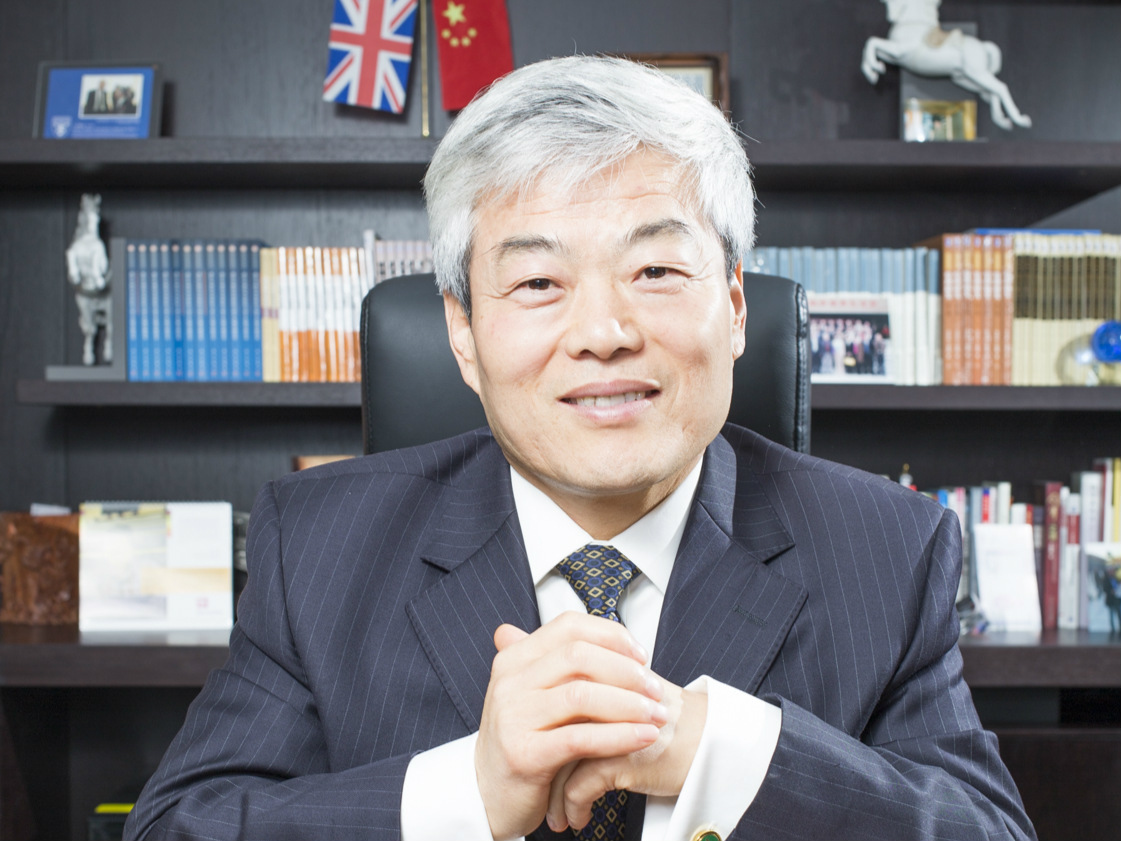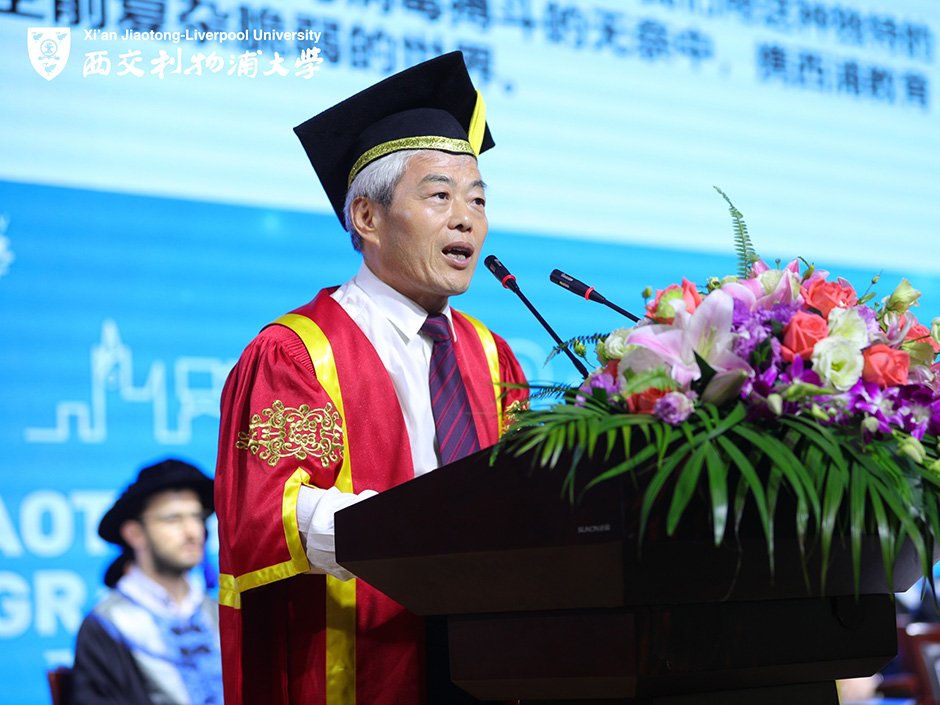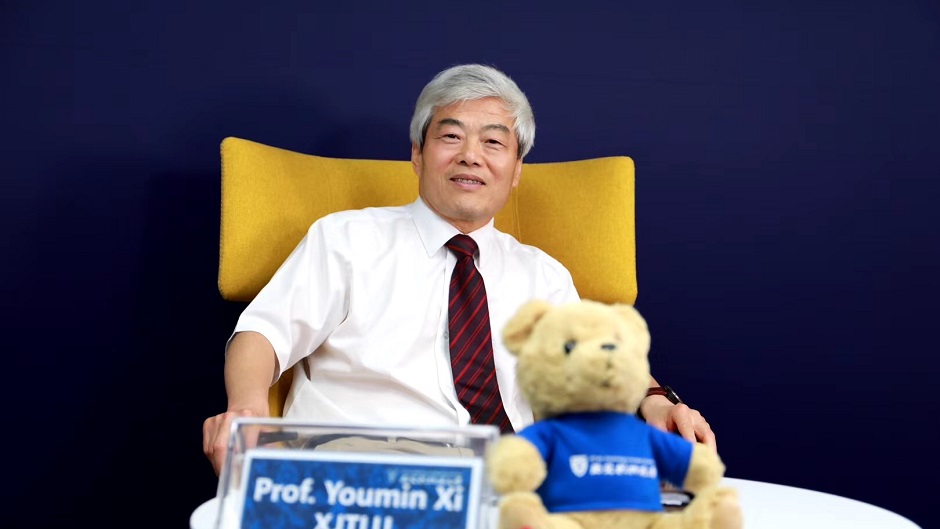10 Sep 2020
Teachers’ Nirvana in the Post-COVID-19 Era
A letter to all XJTLU faculty and staff on the 36th Teachers’ Day
- Professor Youmin Xi
Welcome to the 36th Teachers’ Day! We’ve made it, despite COVID-19 still raging on around the world. On behalf of Xi'an Jiaotong-Liverpool University, I would like to extend my best wishes to all XJTLU faculty and staff members. Take good care of yourself. I wish you all good health! I would also like to thank my colleagues for your arduous and creative work during the outbreak. Your hard work has aided the University in completing a successful semester and starting a new one during the pandemic.
2020 has been a very unusual year. The sudden pandemic has swept the world and disrupted economic and social development and the way of life that we had been used to. It has brought big crises and challenges. It has forced industries and sectors to upgrade and reshape. Education is, of course, one of them.
When it was time for all courses to be moved online, students, teachers, schools and parents were at a loss at first. Then we all took on the challenge unprepared and went through these changes together. Online education has brought us all new experience. After gradually adapting to online education, many people found it hard to go back to the old model, which then triggered a heated discussion about education in the post-COVID-19 era.
In fact, the rise of the internet and digital technology has already called for education reform. However, due to social inertia, many people stayed in their comfort zones and refused to act. Then the pandemic came. It almost brought the world to a halt, which pulled everyone out of their comfort zones. It forced us to reflect on how education and teaching can be reshaped. We even had to redefine the purpose of a university. As the backbone of education, how do teachers recognise future social trends and their needs for talent? How should teachers adjust their own roles and behaviours? And how should we guide the transformation and upgrading of education?
On this year’s Teachers’ Day, while giving you my greetings and best wishes, I also want to share my thoughts on these questions. I hope we can all contribute to educational reform. I want to help promote social development and human civilisation with our wisdom and action, and using XJTLU innovative practices.

1. Moving from observer to learner then innovator
An ecology of learning is emerging, where people can access personalised lifelong learning at a low cost, anytime and anywhere. The behaviour of digital natives is changing rapidly, and new technologies are constantly emerging. The traditional education model is fading away. We have seen many universities, even some century-old ones, going out of business. Many teachers are losing their jobs. The need to reshape education is no longer “crying wolf”, but a life-or-death opportunity that we must grasp.
Without a clear vision for the future, education may lose its meaning. Without enough attention to and proper application of technology, education will be misguided. Teaching methods will become less attractive if we ignore the changes in how students learn today. Educators must wake up and take action during this pandemic. We must reshape the future of education with innovation. We must act before it’s too late.
At the second Chinese-Foreign University Presidents Forum in 2008, MIT’s 16th President Dr Susan Hockfield gave a speech entitled ‘The Progress of MOOCs at MIT’. When answering questions from Chinese university leaders on how to promote online courses, she said one word: leadership. Although her response might seem a bit condescending, it reinforces our belief that we should reshape the era. We must lead the trend of the world’s higher education.
We are positioned as a future-oriented university. XJTLU strives to become a promoter of education reform and innovation. I sincerely call on all XJTLU faculty and staff to take action. We must upgrade our educational philosophy. How do we do this? By reforming the traditional teaching model. By creating a new education culture through the use of new technologies.
2. Moving from teacher to educator
Traditional education focuses on imparting knowledge and answering questions. The schools and teachers play a dominant role. Under this education system, teachers develop corresponding teaching habits. However, in today’s digital age, merely imparting knowledge is losing value. It does not have the power or impact that it did in the past, due to numerous alternatives. Teachers in the classroom feel this pressure from both students and new technologies. Excellent teachers who are good at sharing knowledge and giving lectures in the exam-oriented education environment will slowly fall out of favour. Some believe teachers will become jobless in the future. The root cause is that knowledge acquisition in the new environment is no longer the main function of education. Rather, the focus is on helping students deal with a large amount of intricate information. Students must survive—and thrive—in a world that is increasingly full of uncertainty, ambiguity, complexity and changeability (UACC). They must navigate with ease in a globally connected world with unprecedented changes. These are now the foundational goals of education. That is to say, education should focus on truly transforming and improving people. Teaching methods and the role of teachers must adapt accordingly.
Educators must understand society’s need for talent. We must develop the right kind of education to help students grow. We must promote the cause of education and social development through hands-on educational practice.
Given the explosion of information and easy access to knowledge, interest-driven, active and personalised lifelong learning has become a basic trend of education. Teachers should not only impart knowledge, but also guide and support students. We can enable this through promoting research-led learning and creating an ideal learning environment for students. The role of teachers in education should shift from someone who merely imparts knowledge to an educator who helps students grow. We must serve our students as mentor or coach. We will do this by focusing on helping students understand themselves. We will show them how to set goals, learn how to tap into their individual potentials and constantly improve.
3. The evolution from sharing knowledge to research-led teaching
We are all familiar with traditional teaching. The school formulates education outlines and curriculum. Then teachers help students master this knowledge through classroom teaching and related activities. However, in an era with easy access to knowledge, education should focus on more. We must help students truly know themselves and dare to dream. We must improve their ability to pursue interest-driven lifelong learning. We must help students adapt to future society. We must help them utilise AI, robotic and other technologies to better shape the future.
The shift from simply imparting knowledge to research-led teaching means we must create an environment that combines online and onsite learning. Teachers should guide students in shifting their focus from merely acquiring knowledge to exploring new phenomena or answers to the questions they are facing. Students should learn to solve problems and complete tasks using their own ideas. During this process, teachers should help them understand problems. As students develop their ability to seek information, integrate knowledge and solve problems, they will be better prepared for the future with improved communication, cooperation, innovation, and execution capabilities.
In addition, teachers need to adjust their teaching methods. For example, in order for students to master the concepts and knowledge in the curriculum, you can help them do this by focusing on the practical significance and value of the information or knowledge being shared. Teachers can also help by using relevant projects applicable to a student’s real life and guide them in exploring and solving these tasks with interest-driven manner. By doing so, students will not only acquire knowledge systematically, but also improve their curiosity and critical thinking. In addition, you will help them to cultivate lifelong learning through developing their creativity and nurturing their mindset.
I once advocated that teachers could enable students to understand at five levels from learning one module. First is the status of the module and its value for learners, that is, what kind of problems the knowledge of the module helps to recognise or solve, and what students could get for their life and career development. Second, the knowledge system and architecture of the module. Third, the core technology or tools of the module. Fourth, the methodology of the module. Fifth, the philosophy behind the knowledge of the module. Most teachers are good at the second and third levels, but they often overlook or ignore the first, fourth, and fifth levels.
Teachers usually encounter three types of pressures in the process of the above-mentioned transition: The first is the pressure from internet generation. Teachers need to have a deep understanding of their psychological and behavioural characteristics. The second is the pressure from online education. Teachers should explore a new form of education to combine online with classroom teaching. The third pressure is the constant challenge to balance teaching with research.
However, in the modern technological environment, if research-led education can be truly carried out, the above three types of pressure will be transformed into driving forces for promoting teaching reform. For example, the problems and tasks that teachers conduct research on may serve as an important starting point for teaching. These can be used as ways to arouse the curiosity and motivation of students. Students’ familiarity with the internet is not only conducive to their learning, but can also help teachers with their research. By helping with teachers’ research, students themselves will improve learning and research capabilities. XJTLU students, including undergraduates, have published many papers in world-class magazines and journals, which is proof to this point. When a teacher becomes an educator, education and research will be unified from a logical perspective.
4. From index driven to passion driven
Recently, the excessive focus on the Science Citation Index (SCI) has led to a disruption of teachers’ research, and even, occasionally, academic dishonesty. Authorities have issued policies to curb this undesirable phenomenon. In fact, this is not news to teachers at home or abroad. This problem is universal, varying in format and degree from country to country. Here, I do not intend to discuss the impact of SCI or other similar index on modern education. Instead, I just want to discuss how teachers can move past this “index worship” and be guided by his or her passion for education and research.
Of course, we hope reforms in the education system and resource allocation mechanism will be made as soon as possible. These changes will hopefully rid universities and colleges of the soil that breeds index worship among teachers and students. I hope that the right education philosophy and university positioning will help teachers innovate. As an educational explorer, XJTLU expects our teachers to be future-oriented and passion-driven and to carry out cross-disciplinary cooperation. XJTLU doesn’t link a teacher’s salary to the mere quantity of articles published and projects conducted. Instead, it pays more attention to international peer review. It tries to shield teachers from all kinds of external interference to protect the peaceful education and research environment for all teachers and students here.
I sincerely hope that all XJTLU teachers can truly listen to their inner selves. I hope that they can follow their own curiosity and interest; embrace the challenges facing humanity; move forward and conduct responsible and valuable research. If research-led education and interest-oriented research can be highly integrated, our passion for education and research will produce unimaginable results.
5. From fighting alone to fusing into the ecology
In my professional life, I have seen many teachers devote themselves to doing research and writing papers day and night. These individuals are not even taking breaks on weekends or holidays. In the eyes of others, it’s a life of hardship, but they enjoy themselves. Why? Because they are doing what it takes to pursue their life goals. They are not only teachers, but also fighters. But there is something about these fighters that concerns me. Most of the time, they fight alone. They may not know what the colleague in next door is working on. They do not have a well-established network except for a few partners. As we know, major innovations and scientific discoveries in contemporary times often require cross-disciplinary cooperation on a global scale.
Fortunately, we have entered the digital era where traditional boundaries of space and time have largely diminished. We can learn about the latest progress of global research without leaving our homes. We have the ability to cooperate with partners from all over the world. The lives of teachers can be enriched through technology. In this context, it is critical for teachers to stop fighting alone. We should embrace these changes and possibilities using modern technologies. From my own experience, I think it’s possible to do this as follows:
First, while we enjoy the convenience of technology, make sure to not be distracted by it. Do not lose your peace of mind and concentration. A wise man always finds a higher level of focus and inner peace.
Secondly, the interconnection of today’s world has led to more symbiosis, collaboration, integration and innovation than ever before. Because of this, many things just emerge rather than happen based on a design. Platforms and ecology have become important organisational drivers for development. Therefore, you should build your own life platform or create your own career ecology. It will greatly help with your career and development.
Thirdly, teachers and intellectuals are generally kind of lofty in character. They tend to be unwilling to compromise. However, they are also good at debating and arguing for the purpose of seeking the truth. These traits are conducive to scientific enquiry. However, in today’s world, things like virtual collaboration, platforms and ecology are all based on coexistence and cooperation. Therefore, teachers must learn to be tolerant and be good at coexistence. We must be willing and able to cooperate with people of different personalities and interact and work together in harmony with people of different races, nationalities and cultures. XJTLU advocates an organisational culture of “diversity, regulations, innovation, freedom, and trust". Diversity requires us to be tolerant and inclusive. Regulations are the basis for diverse and orderly coexistence. Innovation is the pursuit of the University and also the results from the diverse and harmonious coexistence. Freedom, especially academic freedom, is a necessary condition to ensure innovation. And trust is a foundation for cooperation and creative breakthroughs.
Lastly, there is no such a thing as a regional market when it comes to knowledge and ideas. Academic study and research must be done in cooperation and competition with international counterparts. Therefore, to carry out valuable research, you must merge into the global academic circle. Find ways to utilise international resources. Learn to weave an international cooperation network. Build your own international academic research ecology.
6. From following the crowd to being who you really are
In a world full of desires for fame and wealth, we are facing all kinds of temptation. In this environment, it is difficult to hold on to our original aspirations and stay true to ourselves. Many people fall into the tide and drift along with it. But teachers should remain vigilant. The most basic characteristics of a teacher are the pursuit of truth, a spirit of inquiry, a clear-cut stance, and having one's own opinions. Because of these traits, teachers may seem out of step with the world.
As I see it, teachers must have not only the enthusiasm for educating people, but also a clear mind and a cool head. They must value the independence of personality and have a clear vision. They must value independent thinking, and know each individual has a free will. All true creation is a departure from the original model. Creation is a breakthrough in social adaptation, and a challenge to the people’s habits. Secondly, teachers must have a strong sense of self-confidence. By that I don’t mean blind confidence, but confidence based on knowledge, research, strength, and a deep understanding of the world. Thirdly, teachers must have the wisdom and courage to face challenges in a calm manner. Last but not least, teachers must have a strong sense of responsibility and be willing to make unremitting efforts to realise their own mission. Teachers must not only dare to speak frankly but also have the courage to bear the consequences of his or her words and actions.
People and society place many expectations on teachers. XJTLU’s mission is to explore and influence the future of education. Our mission depends on the contributions of teachers. We must live up to the title and our own aspirations. My colleagues, let’s adapt to the new changes in the post-COVID-19 world. Let’s avoid getting lost under the UACC environment and keep surpassing ourselves. Let us continue to strive for transformation and reaching our nirvana as teachers.
Professor Youmin Xi
Executive President of XJTLU
Pro-Vice-Chancellor of University of Liverpool
10 Sep 2020
RELATED NEWS

Executive President's 2020 Graduation Address
Setting Off - Finding a Fulcrum to Reshape the World Dear students, colleagues, parents and friends:At this historic time when the world is still wrestling ...
Learn more

Global education’s way forward? Mix online, onsite teaching
International cooperation and education that blends a mix of online and onsite learning, is the torchlight through which globalisation can endure and progres...
Learn more

Unique innovation centre, XJTLU Learning Mall, launches Friday
Students in a state-of-the art classroom in China wear virtual reality (VR) headsets, gesturing in the air as they work on a design. Students at home in Abu...
Learn more








